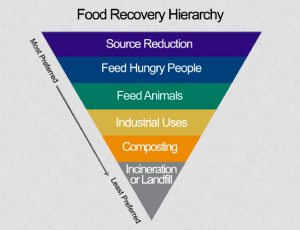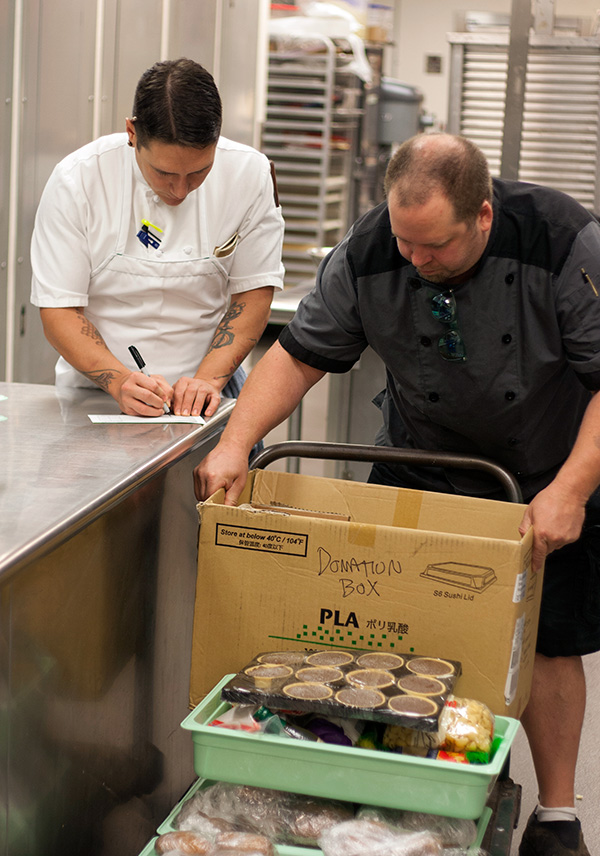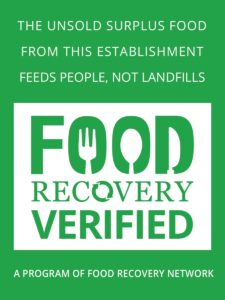
Our Holistic Approach to Waste Management
 At Bon Appétit, we hate waste with a passion. It’s a big contributor to climate change. Wasting food means you’re also wasting all the energy it took to grow, harvest, transport, and cook it. In addition, food decomposing in landfills releases methane, the greenhouse gas that is 20 to 25 times more powerful than carbon dioxide. Not to mention food packaging accounts for almost two-thirds of total packaging waste in American municipal solid waste and is a top pollutant of our waterways and ocean.
At Bon Appétit, we hate waste with a passion. It’s a big contributor to climate change. Wasting food means you’re also wasting all the energy it took to grow, harvest, transport, and cook it. In addition, food decomposing in landfills releases methane, the greenhouse gas that is 20 to 25 times more powerful than carbon dioxide. Not to mention food packaging accounts for almost two-thirds of total packaging waste in American municipal solid waste and is a top pollutant of our waterways and ocean.
We’ve been fighting waste since we opened our doors — waste prevention is inherent in the way we cook and serve our food, preparing meals from scratch in small batches to order, using snout-to-tail and stem-to-root cooking techniques. We take a holistic approach to waste sustainability, following the EPA’s Food Recovery Hierarchy, which focuses on preventing waste before it happens and keeping it out of landfills when it does.
Preventing Waste
There’s no better way to address waste than to stop it from happening in the first place. As great as it is to compost and recycle, it takes a lot of additional resources to turn wasted products into something usable (not to mention those resources that went into producing it in the first place), so prevention is always the first and best way to address waste.
That’s why we focus on:
- Preparing food from scratch in small batches to order and using snout-to-tail and stem-to-root cooking techniques.
-

A Wheaton College student who took our pledge to go trayless
Going trayless at our cafés. We were the first company to talk our guests out of using trays when we saw that it saved on average 3 to 5 ounces of waste per guest each meal.
- Launching Imperfectly Delicious Produce, a groundbreaking program that works with our farmers, suppliers, and chefs to source cosmetically challenged produce that would otherwise be left to rot in the fields or discarded in the processing plant.
- Joining the United States Zero Waste Business Council, the first food service company to do so.
- Supporting the growth of reusable to-go container programs and opting for reusable over disposable serviceware whenever possible.
- Creating a month-long Waste Awareness Campaign that includes training for our employees on proper prep and portioning techniques and guest education on their impact.
- Tracking our daily kitchen waste via Waste Not™, our proprietary app and tracking system that’s designed to inspire behavior change by showing our teams the source and reason for waste, not just measuring the amount of it.
- Pledging to reduce food loss and waste by 50% by the year 2030, as a member of the inaugural class of Food Loss and Waste 2030 Champions.

Food Recovery
Keeping food out of landfills has long been a critical part of our mantra of “food service for a sustainable future,” and we attack food waste through myriad approaches. Our practice of cooking meals to order results in few unsold, unusable items at the end of a meal. However, overly generous estimates for catered events do sometimes result in tasty leftovers such as entrées, whole-grain salads, and baked goods. And during regular café meal service, since we want to provide the same service to the last person in line as the first, there is bound to be some excess.

Food Lifeline picks up excess food from Bon Appétit’s Taste Café in Seattle
Around the country, we work with food banks and nonprofit organizations such as the Food Recovery Network (press release) to take excess, nutrient-dense food from our cafés and get it to food-insecure people.
We’re proud to have:
- Co-authored with the Food Recovery Network A Guide to Food Recovery for Chefs and Managers, which walks students and food service professionals through the process of launching a food recovery program.
- Funded and co-authored the Food Recovery Network’s Guide to Gleaning, which helps students get off campus onto farms and farmers markets to rescue wasted produce.
- Founding partner of Food Recovery Verified, the first verification program for the donation of excess food.
- Been the first food service company to make a national commitment to food recovery through our Low Carbon Lifestyle initiative.
Companywide Waste Commitments
Reducing and preventing waste is a critical part of our efforts to fight climate change, and in 2015 we made a companywide commitment to waste sustainability with our Low Carbon Lifestyle. Prioritizing waste reduction according to the EPA Food Recovery Hierarchy, we aim for landfills to be our last resort by ensuring that accounts are actively preventing waste at the source, donating leftovers to local hunger relief organizations, and diverting waste from landfills.
We have pledged that by 2018:
All of our accounts will be preventing waste at the source in one of the following five ways:
- Regularly purchasing Imperfectly Delicious Produce.
- Hosting an annual waste awareness campaign for the entire café.
- Participating in a year-round waste tracking program like Waste Not. As the old adage goes, what gets measured, gets managed, so when we start tracking food waste we raise kitchen awareness around production numbers and guest preferences which can help prevent waste in the future and ultimately reduce food costs.
- Demonstrating a measurable decrease in disposables through an eco clamshell/reusable container program, which means either demonstrating a 50% decrease in disposables use or having reusable clamshells as the only to-go option in the café. By doing so, we will be preventing a significant amount of food packaging waste.
- Going trayless at all-you-care-to-eat facilities, which has been proven to reduce guest plate waste on average by a third!
 The majority of our accounts (at least 80%) will be Food Recovery Verified, meaning we’re regularly donating our excess food to people in need and verified by an independent third party.
The majority of our accounts (at least 80%) will be Food Recovery Verified, meaning we’re regularly donating our excess food to people in need and verified by an independent third party.
And all our accounts will be diverting wasted food from landfills in one of the following four ways:
- Donating food scraps to farm animals or rescue animals at sanctuaries on a routine basis.
- Recycling waste vegetable oil for industrial uses such as biofuel.
- Processing food waste with a bio-digester to be turned into energy.
- Composting pre and/or post consumer food waste.